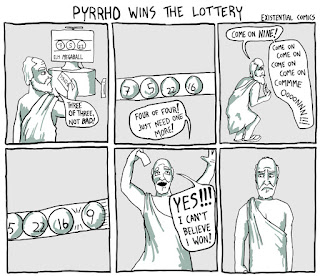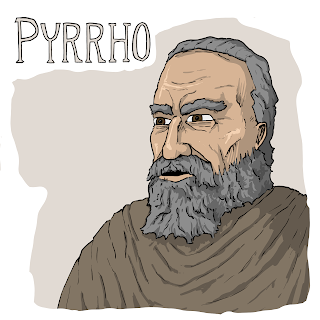Grayson Holley
Section 13
Final Blog Post
Pyrrho's Concept: We Know Nothing
Have you ever woken up and been confused about if you are still dreaming or if you are awake? Maybe you’ve questioned scientific laws and theories. Both of these experiences are examples of being a skeptic. The teaching of Skepticism began in Ancient Greece and Rome by philosophers who questioned anything and everything. The definition of skepticism is “doubt as to the truth of something”. The main teaching of skepticism was the idea that we know nothing. Even what you rely on to be true could be questioned. Everything that you believe in can be doubted, so it’s best to keep a completely opened mind. The most extreme and skeptic philosopher was the Ancient Greek Pyrrho. Pyrrho was the first great skeptic philosopher of the ancient world and was known for teaching crowds of admirers and seekers. “Pyrrho believed that people should always be quick to question and slow to believe. He seemed to think that we too easily become convinced of things that trouble our minds and disturb our souls. So he practiced, and preached, withholding judgment as much as possible.”
Question Everything

Skeptics challenge everything that we know. You are reading this blog post right now, but what if you aren’t? What if you are just imagining that you are reading this? This idea seems like a pretty stretched concept of reality; the idea that you are just imagining what is happening right now. Pyrrho took things even further than this. This quote from ‘A Little History of Philosophy’ states this example of Pyrrho’s skeptic mind: “We can't completely trust the senses. Sometimes they mislead us. It's easy to make a mistake about what you can see in the dark, for example. What looks like a fox may only be a cat. Or you might think you heard someone calling you when it was only the wind in the trees. Because our senses quite often mislead us, Pyrrho decided never to trust them. He didn't rule out the possibility that they might be giving him accurate information, but he kept an open mind on the issue.” He took what would be solid evidence to most people and looked at is as only a suggestion. Pyrrho was such a skeptic that there is a tale that recalls him on a ship at sea during a terrible storm, yet he stayed extremely calm. Even though the wind was ripping apart the sails and the waves were crashing across the boat; he remained indifferent to the thought that he could be injured because he was unsure of any consequences. Another story is that he was attacked by a wild dog and reacted on instinct with fear, but he later apologized to his colleagues for not sticking with his philosophy at that moment.
Pyrrho's Philosophy
Pyrrho had such a calm demeanor and never got worked up about anything because to him nothing is factual; everything is an opinion. He didn’t like to over complicate anything. When people asked him ‘what is the answer to happiness’, his answer was in the form of three questions:
- What are things really like?
- What attitude should we adopt to them?
- What will happen to someone who does adopt that attitude?
His answers to these questions were simple. First, we will never know what the world is really like. Second, we shouldn’t commit to any view. Lastly, if you follow this teaching you will eventually be free from all worry.
Conclusion
Pyrrho was the first extreme skeptic to have such extreme views on reality. He truly questioned everything and was somehow left feeling very calm and content in his demeanor. Many of us could not achieve this level of a skeptic mindset without becoming overwhelmed. Some of us lay in bed at night and contemplate our entire existence, but that’s about as much as we like to question. Perhaps we should try to be as open-minded as Pyrrho and we would be more peaceful. Though, sometimes being too opened minded brings on more problems. Questioning everything just brings on the human need for answers.
Quiz Questions:
1. What are Pyrrho's three answers to happiness?
2. What happened to Pyrrho that made him apologize for going against his philosophy?
Discussion Questions:
1. Is it healthy to be such an extreme skeptic in modern times?
2. How many things do you question in your everyday life? Government? Education?
----------------------
Posts I've Commented On:
Citations:
Warburton, Nigel. Little History of Philosophy. Yale University Press, 2014.

Is it healthy to be such an extreme skeptic in modern times?
ReplyDeleteI think it's good to be skeptical. I also think, however, you can be too skeptical. Take anti-vaxxers, for example. Their extreme skepticism of vaccinations has led to many deaths.
How many things do you question in your everyday life? Government? Education?
I certainly question the intentions of the government very often. I also question the way education is done. I think both could stand a few (or many) improvements.
That was a very going point on the 'anti-vaxxers'.
DeleteI feel like skepticism is a necessary part of survival, however, I find too much skepticism to be a defense mechanism for not wanting to accept reality. I think we should question institutions and infrastructure, but to use that questioning as blame and an excuse for one's own situation is simply running from life.
ReplyDelete"Everything that you believe in can be doubted, so it’s best to keep a completely opened mind" - but not, as the cliche goes, so open that your brains fall out. If Pyrrho was really so constantly doubtful of everything, including his own past experience, he was too open-minded to function safely in the world without a lot of supervision. "Question everything" at least once, but not so constantly that you become permanently incapable of forming actionable beliefs. The ancient therapeutic skeptics were after peace and tranquility, knowledge and truth not so much. We need peace AND truth, don't we? And happiness too. If I ever win the lottery I intend to believe it.
ReplyDeleteGrayson,
ReplyDeleteyour post has brought up some very interesting facts. I feel that skepticism is something that cannot be helped, as there is always doubt in the back of someone's mind, no matter how much the person may believe what is being said.